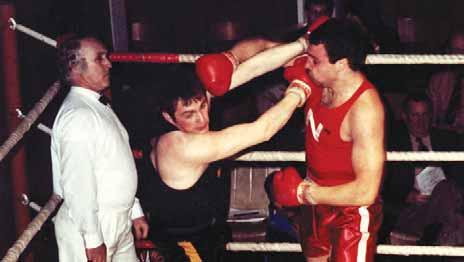
7 minute read
Stories of transformation
Simon Pinchbeck A complete turn around
Major Rosemary Dawson continues a series in which she remembers some of the inspirational people she met while working on the War Cry
AN obsession with money and a serious assault charge against a fellow officer ended a 23-year high profile career with the Metropolitan Police for Simon Pinchbeck.
That obsession also led him into a dangerous liaison with the very people he once tried to apprehend.
‘I went from hero to zero – from being a respectable police officer to no better than a common criminal,’ he confessed.
‘Money became my god. I didn’t care where it came from or how I got it. I was near rock-bottom when God used a reformed villain to get me back on the straight and narrow.’
Joining the Met in 1976, Simon walked the beat in north London before becoming part of the Territorial Support Group, which specialised in public order policing.
‘I was also the Met’s boxing champion,’ he said, ‘and played rugby for the police and other clubs. That was the best period in my career.
‘I was about 40 when I moved to Enfield with my wife and our two young boys. I suppose I had a midlife crisis; I was with a younger squad, all single guys, and adapted to their lifestyle of pubs and clubs. I tried recreational drugs and steroids and could drink for the whole police force. I didn’t care about my family; I just wanted to be out with the lads.
‘We had access to information when organised violence was going to happen. I was right in the thick of the action, addicted to the excitement. That kind of 24-7 job didn’t help my marriage either.
‘Then I got into a fight with another police officer and knocked his teeth out. I was suspended and put on a criminal charge. After a five-day trial at the Crown Court I was acquitted but given a “medical discharge” from the Met.
‘I became increasingly attracted to a more criminal way of life, and that greed led to my downfall. At the gym I mixed with men with money and power from the criminal fraternity. They persuaded me to speculate in a get-rich-quick scheme in Spain. I didn’t smell the rat; I only saw the pound signs.
‘That was the last I saw of my cash,’ Simon said ruefully. ‘Discovering I’d been set up was the lowest point in my life. All my access to money had gone, and I was deep in debt. I had no friends left in the Met; even the criminals didn’t trust me!
‘I was at the gym one Saturday, plotting revenge, when I saw a once notorious drugs baron – now a Christian – on the rowing machine. I thought, “If God can do it for him, maybe he can do the same for me.”
‘So I got talking to him, about life in general and about God. He’d been a football hooligan and I’d chased him all over the terraces – now he was teaching me about God!
‘After meeting up a few times, he suggested I go to church. I was brought up a Catholic but, to me, “church” just meant saying lots of prayers. I’d sworn on the Bible many times during my career, but it could have been a women’s magazine for all it meant.’
Still angry and bitter towards the people who conned him, Simon eventually went to a service at Holy Trinity, Brompton, where Nicky Gumbel – the minister who pioneered the Alpha course – prayed with him.
‘Undergoing the course taught me what it meant to be a Christian and helped me make a proper commitment to God,’ recalled Simon. ‘I asked him to bring peace into my life – and he did. All the anger, bitterness and resentment about the past went from me. It was an amazing feeling.’
Simon was also reconciled with his father, who was undergoing treatment for leukaemia. Simon prayed with him, asking that he be given peace of mind. ‘When he died I had a great sense of peace because he had a knowledge of God,’ he said. ‘If I’d hung on to my resentments, he wouldn’t have had that.’
Simon’s life had completely turned around, as he explained: ‘In the past I tried to fill the hole in my life with money, clairvoyants and books telling you how to change your life. They didn’t work. It took me 40 years of going round in circles before I found the love of Jesus and became a complete person.
‘I still find it hard to be a Christian,’ he said, ‘but now I know I don’t have to struggle alone. If I do stumble, I know I can ask forgiveness and be helped along the way.’
Based on an article published in the War Cry, 4 August 2007
Simon (right) boxing for the Met
MAJOR ROSEMARY DAWSON MA
Retired St Austell
Sin, confession and repentance

Major Cliff Allchin considers God’s solution for people who have sinned against him
ISAIAH 59
SOMETIMES in our walk of faith we are faced with a question that strikes at the heart of God’s nature and his relationship with humanity. The question is often framed by the contrast between life’s pain and God’s love and omnipotence.
Isaiah 59 begins with a form of that question. The prophet asks: If God has not saved his people from their trials is it because he lost some of his power? The answer to this dilemma is not an easy one, for sometimes the problems we face are of our own making.
QUESTIONS
Can you remember a time when you questioned the presence of suffering in God’s world? What pain were you going through? Were you able to solve this question of pain?
The Jewish people are in exile in Babylon. They are perplexed. They feel that God has somehow let them down and they begin to question his power and authority.
Isaiah concludes that God’s power has not dimmed and that the problem lies with the people. They have sinned – in their actions and their words (v3), by withholding justice with a lack of integrity (v4) and by taking wrong paths that are evil, crooked, violent and devoid of peace (vv5–8).
The result of this sin is that the Jewish nation is lost. The people have lost their standards of justice and righteousness. They are lost as a blind person can be in darkness, and deliverance seems far away (vv9–11).
QUESTIONS
Carefully consider the images that Isaiah draws in verses 3 to 11. How do they speak to us? Can any of the errors of Jewish society that Isaiah depicts be seen in our own society? Who is responsible? (Read Amos 5.)
Verses 12 to 15 are, as one Bible commentator says, a ‘reality check’. The evidence of the sins committed by the Jewish nation is so heavy that the people are haunted by them. These verses resemble the anguish of Shakespeare’s Macbeth and his guilt-ridden angst: ‘Will all great Neptune’s ocean wash this blood clean from my hand? No, this my hand will rather the multitudinous seas incarnadine, making the green one red.’
QUESTION
How does sin separate us from fellowship with God, and with what results (v2)? (Read Genesis 3:16–23.)
The remedy for the Jews who are in exile begins with confession. Isaiah
Through the week with Salvationist
– a devotional thought for each day
by Lieut-Colonel Brenda Oakley
SUNDAY
Able to save, able to keep,/ Yes, my Lord is able./ Giving me grace, giving me power,/ Yes, my Lord is able./ He has turned the darkest night to day,/ That’s the reason I can say:/ He’s able to save, able to keep/ Is Christ, my Saviour.
(SASB 235)
MONDAY
Surely the arm of the Lord is not too short to save, nor his ear too dull to hear.
(Isaiah 59:1)
Prayer
Heavenly Father, we ask your forgiveness for the many times we have failed you, when sin has taken hold of our lives and led us away from you. Help us to be more aware of your presence as your Holy Spirit seeks to guide and direct us. TUESDAY
He came to give us life in all its fullness,/ He came to make the blind to see,/ He came to banish death and doubt and darkness,/ He came to set his people free./ He liberating love imparted,/ He taught men once again to smile;/ He came to bind the broken hearted,/ And God and man to reconcile. (SASB 139)







